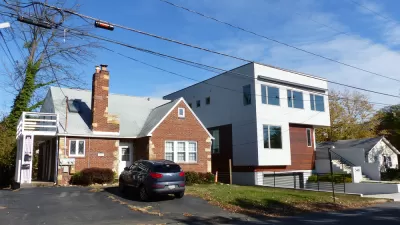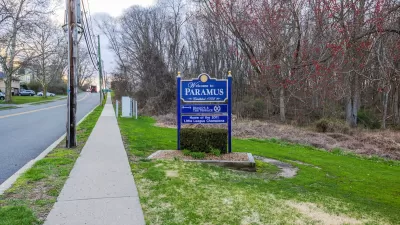Two bills that would change zoning rules to encourage more housing production and denser zoning are still in limbo as the legislature prepares to go on recess.

A pair of zoning reform bills before the Connecticut state legislature are in danger as the legislative session draws to a close, warns Ginny Monk in CT Mirror. “With the weeks waning in the legislative session, lawmakers are reaching a crucial point of negotiation to get any zoning reforms through.”
The two bills in question concern ‘fair share,’ a concept similar to California’s Regional Housing Needs Assessment (RHNA), and transit-oriented development.
As Monk explains, “Connecticut’s [fair share] proposal would have the state analyze regional housing needs, which would then be divided up between towns.” This isn’t the first attempt by the state to stimulate housing development. “Under a 2017 law, towns were required to submit affordable housing plans last summer,” but less than half of Connecticut towns met that deadline.
Meanwhile, “The transit-oriented development bill, also known as Work, Live, Ride, would use certain infrastructure grants to encourage towns to increase residential density near train and bus stations.”
Local leaders call the proposals “burdensome to towns,” while housing advocates say the state must step in when cities are reluctant to create affordable housing in their communities.
FULL STORY: Will CT legislators pass zoning reforms before they run out of time?

Maui's Vacation Rental Debate Turns Ugly
Verbal attacks, misinformation campaigns and fistfights plague a high-stakes debate to convert thousands of vacation rentals into long-term housing.

Planetizen Federal Action Tracker
A weekly monitor of how Trump’s orders and actions are impacting planners and planning in America.

In Urban Planning, AI Prompting Could be the New Design Thinking
Creativity has long been key to great urban design. What if we see AI as our new creative partner?

Pedestrian Deaths Drop, Remain Twice as High as in 2009
Fatalities declined by 4 percent in 2024, but the U.S. is still nowhere close to ‘Vision Zero.’

King County Supportive Housing Program Offers Hope for Unhoused Residents
The county is taking a ‘Housing First’ approach that prioritizes getting people into housing, then offering wraparound supportive services.

Researchers Use AI to Get Clearer Picture of US Housing
Analysts are using artificial intelligence to supercharge their research by allowing them to comb through data faster. Though these AI tools can be error prone, they save time and housing researchers are optimistic about the future.
Urban Design for Planners 1: Software Tools
This six-course series explores essential urban design concepts using open source software and equips planners with the tools they need to participate fully in the urban design process.
Planning for Universal Design
Learn the tools for implementing Universal Design in planning regulations.
planning NEXT
Appalachian Highlands Housing Partners
Mpact (founded as Rail~Volution)
City of Camden Redevelopment Agency
City of Astoria
City of Portland
City of Laramie





























